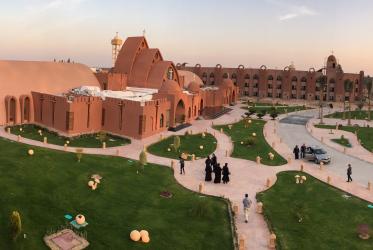Sermon by Rev. Dr Susan Durber
Closing Prayer
Faith and Order Plenary Commission
13 October 2009, Crete, Greece
Once, when I was going through a particularly difficult time in my life, a time of loss, I was walking through the city where I lived, hardly caring whether I made it to my destination. I can remember staring, as I walked, at the pavement, and it was raining in that way it does in Britain; half-heartedly and miserably. Suddenly a man I had never met before, rather scruffy in appearance, and smelling slightly of drink, stumbled into my path and said right into my face, ‘Get through it girl!’ And I did get through it. Who was it who spoke to me that day?
Someone I once knew when I lived in the United States for a time – a Lutheran pastor – was visiting a McDonalds, having just taken a very difficult funeral service. As he started on his fries a very large man came and sat at his table, in the same booth, immediately across from where he was sitting. My friend was nervous. ‘How are you doing Father?’ the man said. (The clerical collar of course…) ‘You look like you’ve had a bad day. Would you like to talk about it?’ Something made my friend tell the story of how the day had been, how he’d driven at first to the wrong cemetery and then not felt he’d done a good job for the family. Then this unknown man reached across the table and asked whether he believed all that stuff about Jesus rising from the dead. My friend was taken aback and mumbled that he did believe it, but that there were days when it was hard to believe it. ‘I thought so’ said the stranger, and then left. Years later, on a sabbatical, my friend read the story of the journey to Emmaus, and suddenly realised who the stranger was in McDonalds all that time ago. It is firmly in the tradition of our faith, and it is firmly rooted in our experience, that Christ comes to us in the company of strangers.
But, central though this insight is, we keep forgetting it. And we cling very hard instead to our friends, to those who are like us and whom we like, in the hope that we will find Christ there. In an uncertain world, and in places and communities where diversity can seem sometimes not to be aesthetic decoration, but rather hovering threat, we cling to those we know and love well, instead of being turned towards those who are strange to us and to whom we are strange. It doesn’t take a genius to work out that this can’t be good for us. It can’t be good for ecumenism, for the mission of the church, for inter-faith dialogue or for the peace of the world, or indeed for any kind of human flourishing. But the truth keeps returning to us - in the way of things, or perhaps the ways of God.
Over these days many of us will have had moments when we have recognised the strangeness of others to us, and perhaps more significantly, our strangeness to them. No-one is normal. We just get used to the way we are, and often so used that we’d defend it almost without knowing why. There is a deeply rooted human fear of the stranger, whether that stranger is someone else or the stranger within ourselves. And we know that it takes a certain kind of self confidence combined with a certain kind of open humility to be willing to meet strangers, so much so that often strangers have to surprise us with their presence. Yet, the Bible tells us and experience tells that it is often through the stranger that God speaks.
In all the faiths which come from Abraham, and probably in others too, hospitality is key. Wherever you look in the Old Testament or the New you find stories of God’s people being hospitable, being welcoming, open and receptive to the world and its people. And, perhaps even more, you find stories of people of faith being willing to receive the hospitality of others, and receiving it gladly believing that they will in doing so meet God himself. But the hospitality we see revealed in the Bible stories is different from some of the notions of hospitality that I have learned in my context. We tend to think of hospitality as inviting a few selected people into our own intimate space. It might be very generous, very lavish, very carefully planned and in many ways very open, but it is usually thought of as being welcoming to our friends, to neighbours or to business associates. But the biblical understanding of hospitality is something else. It is about welcoming the stranger. I understand that the Greek word for hospitality, the one used often within the New Testament, is a word which means literally ‘love of the stranger’ - philoxenia. So, if we’re to be hospitable in a truly biblical sense, it doesn’t mean that we will throw lots of parties for our friends, but that we will find ways to be truly welcoming to strangers.
The other important thing about the biblical view of hospitality is that it’s as important to receive it as to give it. We can very easily imagine that God wants the church to be hospitable, welcome and inclusive. We can readily think of the church as ‘host’. But it’s interesting, isn’t it, that of all those countless stories about Jesus sharing meals with disciples, with Pharisees, with tax-collectors, with whoever it was, he was not the host, but pretty much always the guest. Jesus was the stranger who was welcomed. He was the one who received hospitality - and it was in that way that he found a place to offer the welcome of God. He did not invite people to enter his space on his terms – he willingly entered their homes, their space, their communities, and laid himself open to them. Whether you think of Jesus eating with the disreputable, or with those disciples at Emmaus, he was the guest, receiving what was offered. And when he asked the disciples to follow him, he didn’t suggest that they had open house or offered hospitality to guests, but he sent them out in such a vulnerable condition that they would have to rely on the hospitality of others. Jesus sent his disciples out - without spare clothes, without a stick to lean on, completely vulnerable. To be a disciple is to be open to receive hospitality and vulnerable enough to need it.
In some of our contexts, and in different ways, the church now seems more to be in the ‘guest’ than the ‘host’ position. We are strangers sometimes in our own lands – whether that’s as 3% of those who are Christian in Asia, whether that’s as a minority of Christians in a predominantly Muslim country or whether that’s in increasingly atheistic Europe. We are learning now how to be those who are dependent on the hospitality of others. Hospitality is not simply the generous gift of the wealthy and powerful, it is also the skill and grace of the weaker ones.
But what would it mean for the Church to be a community that is truly - and by definition - loving and welcoming to strangers? And what would it be mean for us as churches to be truly hospitable, in the spirit of Christ, to one another? There is one view that says that the way to be welcoming to strangers is to draw them in as quickly as possible to be firm friends. But ironically, it is true that close groups with the warmest of friendships are the hardest ones to get into and to become part of. To offer someone a real welcome is to offer them a space in which they can be themselves and stay at a distance if need be, not to propel them into a close intimacy for which they are not yet ready. One the papers we heard this week spoke of the importance of the ‘ante-room’ kind of space, where strangers can venture in safety. It is the creation of this more public space which makes any community truly hospitable. Just as the ancient Jewish temple had a court of the Gentiles, a space for strangers, so we also need a kind of threshold space where strangers can be made welcome. If we speak of receptive ecumenism, then perhaps we need something like reception rooms, where truly hospitable spaces can be made.
And there is also that significant strand of the Bible stories about hospitality which is about receiving it as well as giving it. If we are really to be open to each other we need to be willing to experience others on their own terms and not only on ours. We need to be both strong and vulnerable enough to venture into the strange space of the church of another tradition, or even of the house of our neighbour, and to see what hospitality we shall find there, while we ourselves are made vulnerable. We need to be willing to receive, to sit down and eat in plenty from strange tables. Not for us ecumenical anorexia, but ecumenical plenty.
Hospitality is everywhere in the Gospel story. The call to love the stranger. The mission to go out with nothing in order to be dependant on the kindness of strangers. The simple loaves and fishes made into a feast. The water turned to the wine as fine as Cretan wine. But most important of all, of course, is the story of Jesus the stranger; the Word of God making a home among us, the one who had nowhere to lay his head, the one who appeared as a stranger on the Emmaus road. And there is that powerful tradition that Jesus said, ‘I was a stranger and you visited me...’ and ‘If you did it for one of the least of these you did it for me...’ When we welcome the stranger, we are welcoming Christ himself.
In Britain, our children are taught about stranger danger, as I expect some of yours are too. And we are right to make them cautious and to keep them safe, but we should never forget that there is the most terrible danger in staying only ever with our friends. God calls us to love the stranger, and in any stranger Christ may and does meet us. Having received so much from the generous hospitality of God, let us live hospitable lives, let us be lovers of strangers, just as God has shown the deepest love to the strangest of us. Amen.



